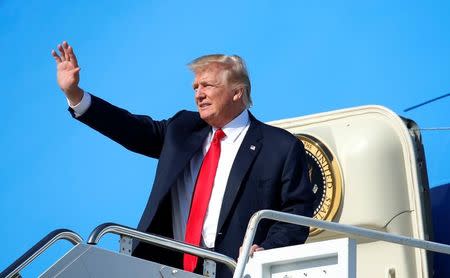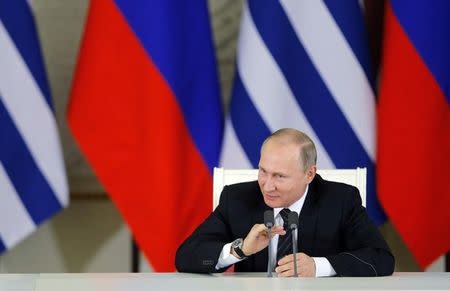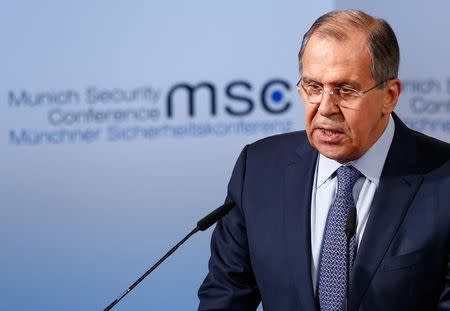No change in Russia's U.S. policy despite Trump, officials say
By Jonathan Landay MUNICH (Reuters) - Russia has shown no change in behaviour or policies to embrace U.S. President Donald Trump's offer of better relations or cooperation in fighting Islamist militants, U.S. officials and lawmakers say. Trump's latest overture was delivered by Vice President Mike Pence on Saturday to a security conference in Germany held amid European worries over U.S. commitment to the continent's security and an uproar over former national security adviser Mike Flynn's contacts with the Russian ambassador to Washington. "Know this: the United States will continue to hold Russia accountable even as we search for new common ground, which, as you know, President Trump believes can be found," Pence told the Munich Security Conference in the administration's first major foreign policy address. Russia, however, has stepped up provocative actions by staging dangerous low-level fly-bys of a U.S. warship in the Black Sea this month and sending an intelligence-gathering ship to within 30 miles of the U.S. coast, said U.S. officials, lawmakers and other experts. "Running a spy ship up the coast of Connecticut is not what you'd traditionally think is an overture for cooperation," said Democratic Senator Chris Murphy, who represents the east coast state. "You've had these repeated public overtures from the Trump administration that have been met with repeated provocations by Russia," he told Reuters. To be sure, Russian President Vladimir Putin and other top officials have expressed a readiness to cooperate with the Trump administration on a range of issues, including fighting Islamist extremism. "ALL RHETORIC AND NO ACTION" In Munich, Russian Foreign Minister Sergei Lavrov said Moscow wanted better relations with the United States. "The potential for cooperation in politics, economy and humanitarian sphere is huge. But it has to be implemented. We are open to this as much as they in the United States," he said. But Michael McCaul, a Texas Republican who chairs the House Homeland Security Committee, said: "Right now, it's all rhetoric and no action" by Putin. This was particularly true in Syria and Ukraine, he said. Having backed the government's capture of the rebel-held half of Aleppo in December with devastating air strikes, U.S. officials said Moscow had continued to focus most of its attacks on civilian areas and on Western-backed moderate rebels rather than on Islamic State, which Russia says is its main target. Moreover, they said Russia had declined to pressure Syrian President Bashar Assad into engaging seriously in U.N.-brokered talks with Western-backed rebels on a peace plan that eventually would have Assad cede power to a national unity government. In east Ukraine, meanwhile, U.S. officials said Moscow had continued supplying heavy weapons to pro-Russia separatists amid a surge in fighting. Moscow also dismissed a White House call this month to return Crimea, the peninsula that it seized from Ukraine in 2014. In his speech, Pence called on Russia – which blames Ukraine for the new bout of fighting - to implement agreements reached with Ukraine, Germany and France on resolving the conflict, "beginning by de-escalating the violence in eastern Ukraine." William Courtney, a former U.S. ambassador to ex-Soviet republics and arms control negotiator now with the RAND Corp think-tank, said there had been "no signal ... that they are going to pull heavy equipment from Ukraine or reduce support to the rebels." LACK OF GESTURES He said the lack of reciprocal Russian gestures may be due to Moscow's unfulfilled expectations that Trump would offer to lift U.S. sanctions imposed for Russia's seizure of Crimea in return for cooperation against Islamic State. U.S. and European officials remain deeply worried over what they say are unrelenting Russian actions – including cyber attacks, fake news reports and support for right-wing parties – aimed at boosting the election prospects of anti-immigrant politicians in France, Germany and the Netherlands and undermining popular support for the European Union and NATO. Lavrov for his part said on Saturday that he saw "no facts" pointing to Russian hacking to influence the outcome of elections in other countries, including the United States, and that Russia did not want its citizens to engage in cyber crimes. Leon Aron, director of Russia studies at the American Enterprise Institute, a conservative think-tank in Washington, said there was virtually no chance that Putin would genuinely embrace Trump's outreach. He said Putin's popularity and the legitimacy of his government rested on a strategy of confrontation with the West that diverted popular attention from Russia’s internal economic and social woes and widespread corruption. "Domestically, Putin is so much limited in what he can do," said Aron, explaining that low oil prices and U.S. and EU economic sanctions had constrained his ability to boost living standards. "He needs an enemy and he needs foreign policy victories. This is the key to his popularity, which in turn is the key to regime legitimacy." (Additional reporting by Vladimir Soldatkin; Editing by Kevin Liffey)




